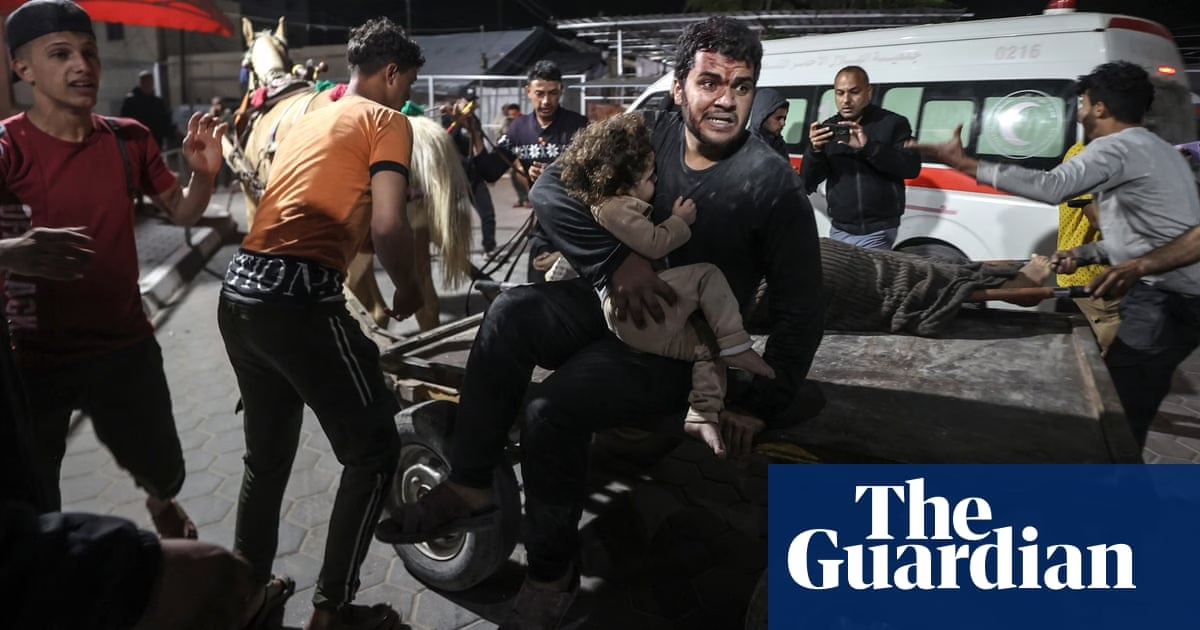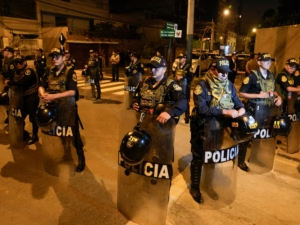<
div>
Good morning. Just before 2.30am local time on March 18, 2025, Israel launched airstrikes on dozens of targets across Gaza. War planes hit sites across the territory, from Gaza City in the north to Khan Younis in the south. At least 330 people have been reported dead so far, Gaza’s health ministry said, and Benjamin Netanyahu’s office appeared to suggest that the two-month-old ceasefire is now over: “Israel will, from now on, act against Hamas with increasing military strength,” it said.
You can follow the latest updates at the Guardian’s live blog. Today’s newsletter explains what’s happened overnight, and why. Here are the headlines.
Five big stories
UK politics| Keir Starmer will unveil drastic cuts to disability benefits on Tuesday, despite deep opposition from Labour MPs and poverty campaigners, and warnings from economists against making kneejerk savings to hit fiscal targets. The changes are expected to affect some of the UK’s most severely disabled people.
UK news| Lucy Letby has called for the public inquiry into her crimes to be halted, arguing there is now “overwhelming and compelling” evidence undermining her baby murder convictions. Lawyers for the former nurse took the extraordinary step of writing to Lady Justice Thirlwall on Monday to say that the inquiry – due to end on Wednesday – should be suspended immediately.
Space | Two Nasa astronauts “stranded” aboard the International Space Station (ISS) since last summer were finally on their way back to Earth on a SpaceX vessel on Tuesday, more than nine months after the failure of Boeing’s pioneering Starliner capsule scuppered their originally scheduled week-long mission.
Finance| The hedge fund manager Crispin Odey will be banned from the City and hit with a £1.8m fine by the UK’s financial watchdog for deliberately attempting to “frustrate” a disciplinary process into sexual harassment allegations.
Second world war| The last surviving Battle of Britain pilot, John “Paddy” Hemingway, has died aged 105. The Royal Air Force (RAF) said Hemingway, a member of “the Few” who took to the skies during the second world war, died peacefully on Monday.
In depth: ‘They unleashed the fire of hell again on Gaza’
Since the first phase of the ceasefire in Gaza expired in early February, many Palestinians have been braced for a return to war at any time. Instead of moving on to a planned second phase, Israel cut off aid shipments into the territory and pressed Hamas to accept a plan that would extend the first phase and bring the release of more hostages, a move Hamas was unwilling to take without steps towards the complete withdrawal of Israeli troops.
Two days ago, talks in Doha failed again to reach an agreement. One key question now is whether the airstrikes unleashed overnight herald a full-scale return to hostilities, with Israeli ground troops operating in Gaza again and Hamas responding, or are an attempt by Benjamin Netanyahu to force Hamas to accept Israel’s terms – but the very hostile language from Israel suggests that the latter is now unlikely.
Here’s what else we know.
What kind of damage has been done?
The first explosions were heard in north-west Gaza, as many ate their pre-dawn meals during the holy month of Ramadan. The airstrikes hit Gaza City in the north, Deir al-Balah in the centre, and Khan Younis and Rafah in the south. Israel said that it had hit “terror targets belonging to the Hamas terrorist organisation”.
Witnesses and photographs taken at Gaza’s hospitals suggested that many civilians, including children, were among the dead, with piles of bodies stacked up under white plastic sheets. AFP quoted Ramez Alammarin, 25, who described carrying children to a hospital near Gaza City. “They unleashed the fire of hell again on Gaza,” he said. “Bodies and limbs are on the ground, and the wounded cannot find any doctor to treat them. They bombed a building in the area and there are still martyrs and wounded under the rubble … fear and terror. Death is better than life.”
The European hospital in Rafah said that 17 members of one family, including 12 women and children, were killed there. Mahmoud Abu Wafah, Gaza’s deputy interior minister and the highest-ranking Hamas security official in the territory, was reported to be among the dead.
The toll, recently reported at 330, is likely to rise, since it does not include all those taken to smaller health centres or those yet to be found by rescuers.
Is the ceasefire over?
By one very clear measure, yes: while Israel has carried out some drone strikes against suspected militants in recent weeks, the overnight airstrikes are on an entirely different scale.
The statement from Benjamin Netanyahu’s office referring to plans to act with “increasing military strength” also appears to point in a clear direction. And the White House, which was consulted before the new attack, said: “Hamas could have released hostages to extend the ceasefire but instead chose refusal and war.”
Hamas, meanwhile, accused Israel of treachery for overturning the ceasefire, and said that Netanyahu is using the war as a “lifeboat” to ensure his own political survival amid domestic crises. But it has not yet said specifically that it is resuming the war. One official, Taher Nunu, said: “The international community faces a moral test: either it allows the return of the crimes committed by the occupation army or it enforces a commitment to ending the aggression and war against innocent people in Gaza.”
There is also a question about whether the airstrikes are a prequel to a return of Israeli ground forces. The Associated Press quoted one Israeli official who said that there was a plan to expand the operation beyond air attacks.
What does the attack mean for the hostages?
Fewer than half of the 59 hostages left in Gaza are thought to still be alive. Some of those released so far have urged the Israeli government to press ahead with the ceasefire to ensure the return of those still being held in Gaza.
The Hostages and Missing Families Forum, the main group representing families of the captives, this morning accused the government of backing out of the ceasefire, saying it “chose to give up on the hostages”.
“We are shocked, angry and terrified by the deliberate dismantling of the process to return our loved ones from the terrible captivity of Hamas,” it said in a statement.
The issue was expected to surface again today and tomorrow during demonstrations planned in response to the news that Netanyahu wants to fire Ronon Bar, the head of the internal security agency Shin Bet. Bar was a key player in negotiations to free the remaining hostages until he was replaced in that role last month, and one opposition leader in Israel, Yair Golan, this morning accused Netanyahu of ordering the renewed attacks to deflect attention from Bar’s planned removal.
Netanyahu has sought to blame Hamas’ refusal to release the remaining hostages without moving to a second phase for the resumption of strikes in Gaza; Donald Trump recently said that unless Hamas immediately released all remaining hostages, “not a single Hamas member will be safe”. He also appeared to threaten civilians in Gaza.
But Hamas has been reluctant to give up its sole remaining source of leverage without a move to the second phase of talks. It said last week that it was ready to release American-Israeli soldier Edan Alexander and the bodies of four others, but US Middle East envoy Steve Witkoff rejected that offer and said that Hamas had privately made unrealistic demands.
Now Hamas is threatening the last living hostages in captivity, saying: “Netanyahu’s decision to resume war is a decision to sacrifice the occupation’s prisoners and impose a death sentence on them.” If that happens, there would appear to be very little hope of an end to the war before Israel is satisfied that Hamas has been completely eliminated – and before many more Palestinian civilians are killed.
after newsletter promotion
What else we’ve been reading
<
ul class=”dcr-s3ycb2″>








